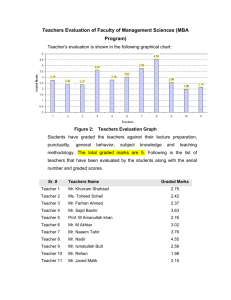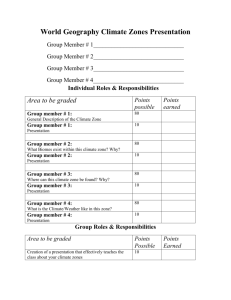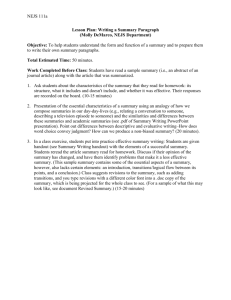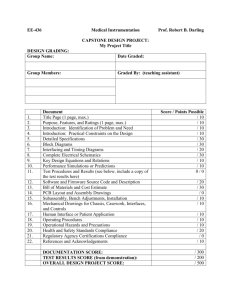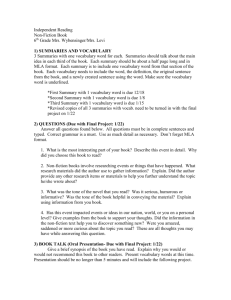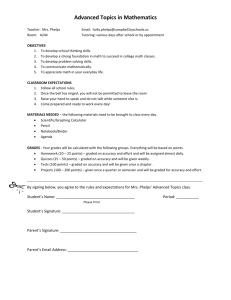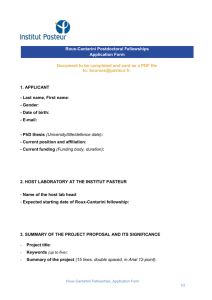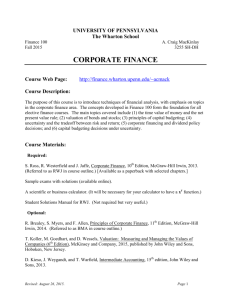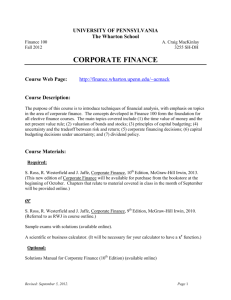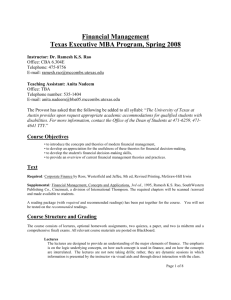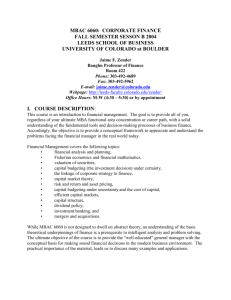BMA 5312: Advanced Corporate Finance Semester 2, 2008/2009
advertisement
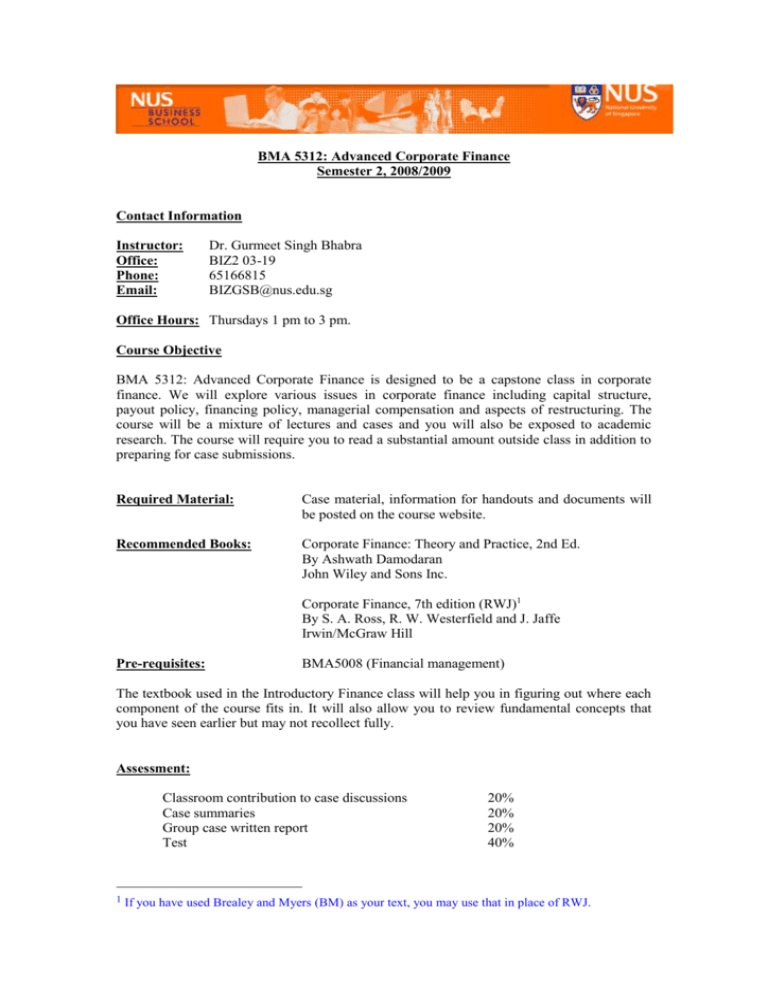
BMA 5312: Advanced Corporate Finance Semester 2, 2008/2009 Contact Information Instructor: Office: Phone: Email: Dr. Gurmeet Singh Bhabra BIZ2 03-19 65166815 BIZGSB@nus.edu.sg Office Hours: Thursdays 1 pm to 3 pm. Course Objective BMA 5312: Advanced Corporate Finance is designed to be a capstone class in corporate finance. We will explore various issues in corporate finance including capital structure, payout policy, financing policy, managerial compensation and aspects of restructuring. The course will be a mixture of lectures and cases and you will also be exposed to academic research. The course will require you to read a substantial amount outside class in addition to preparing for case submissions. Required Material: Case material, information for handouts and documents will be posted on the course website. Recommended Books: Corporate Finance: Theory and Practice, 2nd Ed. By Ashwath Damodaran John Wiley and Sons Inc. Corporate Finance, 7th edition (RWJ)1 By S. A. Ross, R. W. Westerfield and J. Jaffe Irwin/McGraw Hill Pre-requisites: BMA5008 (Financial management) The textbook used in the Introductory Finance class will help you in figuring out where each component of the course fits in. It will also allow you to review fundamental concepts that you have seen earlier but may not recollect fully. Assessment: Classroom contribution to case discussions Case summaries Group case written report Test 1 20% 20% 20% 40% If you have used Brealey and Myers (BM) as your text, you may use that in place of RWJ. Course Structure and Classroom Procedure This course consists of two parts. In the first part, basic finance principles and techniques are reviewed. In the second part of the course, cases are used, requiring a higher level of analysis and business judgment. Discussion of cases is led by you and your fellow class members. You should have access to a standard corporate finance text in order to prepare the assigned cases effectively. Each member of the class assumes a responsibility for preparing each case and for contributing ideas to the case discussion. To be effective, you must think the problem through to a decision, be able to explain your analysis to classmates, and then defend your position. Typically, there is no one right answer to a case. In many ways, the process by which answers are sought is as important as the answers themselves. Students are required to work in groups for the assigned cases. Groups will be formed within the first two weeks of the semester. Working in groups improves the quality of analysis, develops interpersonal and time management skills, and illustrates the benefits of dividing work so that each group member contributes in the areas where that person has a relative advantage. Course Policies and General Information 1. Class participation will count for 20% of the overall course grade. 2. A three-hour Test will be given at the end of the term (time TBA). This will be an open book test and will involve analysis of a finance case. This test will count for 40% of the overall course grade. 3. Group case summaries. Each group will prepare a summary report on 5 cases (to be assigned by the lecturer). These reports should be no more than four typewritten pages in length (double-spaced, 12-point font) per case. Essentially, this exercise is designed to expose you to a variety of case situations beyond the one comprehensive case analysis that you will conduct (as a group). These summaries will be graded for written expression and presentation and these are collectively worth 20% of the course. In preparing written reports you should pay particular attention to the assumptions you make, the method of analysis you employ, and the recommendations you make. The report should be readable as a freestanding document and should make clear the nature of your qualitative analysis. You may assume that the reader has read the case and is familiar with conceptual material presented in the course’s textbooks and lectures. Summaries are due by 5:00 pm on the Friday of Week 10. 4. Group case written report and presentation. Each group will be assigned a case. The group will then prepare a written report on the case and also make an in-depth presentation in class on the assigned date. Every member in the group has to contribute towards the presentation. 50% of the marks for the written case report will be based on the quality of the presentation and every presenter will be graded individually on the presentation (only the group case report, which constitutes the other 50% of the marks for the report, will be graded as a group). The group case written report should be no more than ten typewritten pages in length (double-spaced, 12-point font) plus any exhibits. The group report will be graded by the course lecturer for both form and content. The group case written report will be worth 20% of the overall course grade. Submission Date: Only groups for the first four presentations will be allowed to submit their reports in the third week of presentations i.e. week 9. From that day every group will submit the written case report on the day of the presentation. Class Schedule Week Topic/Case 1 Estimating Hurdle Rates for Firms & Projects 2 Estimating Earnings and Cash Flows 2 Investment Decision Rules 3 Investment Analysis: Project Interactions, Side Benefits and Side Costs 3 Financing Mix: Tradeoffs and Theory 4 Financing Mix: Choices and Optimal Mix 4 Dividend Policy 5 Acquisition Valuation 6 Real Options Group Case Presentations Cases used in the course broadly attempt to cover the following topics: Financial analysis and forecasting Estimating the cost of capital Capital budgeting and resource allocation Management of corporate capital structure Valuing the enterprise (mergers, acquisitions, restructurings) Setting corporate financial policy Risk Analysis and Real Options Week 7 : E.I. Du Pont de Nemours and Company (1983) Week 7: American Home Products Corporation Week 8: Dividend Policy at FPL Group Inc. (A) Week 8: Sampa Video, Inc. Week 9: Marriott Corporation: The Cost of Capital (Abridged) Week 9: Radio One, Inc. Week 10: Cooper Industries Week 10: Interco Week 11: Philip Morris Companies and Kraft, Inc. Week 11: Laura Martin: Real Options and the Cable Industry Week 12: Vodaphone Airtouch’s Bid for Mannesmann Week 12: Pinkerton (A) Week 13: Review Week 14: Test
